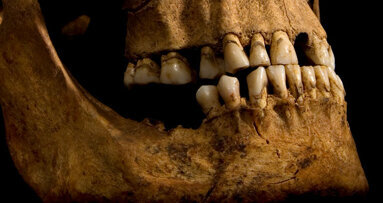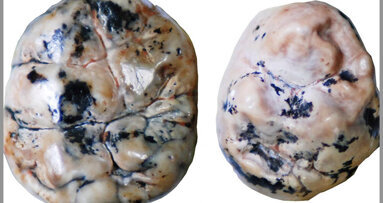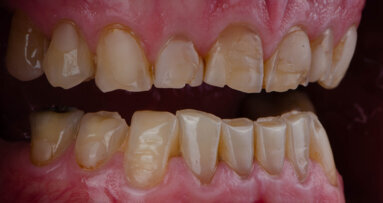EDINBURGH, UK: The Great Irish Famine is something etched into European history. The impact of the famine has been well documented, and in a new study that adds to this cache of information, researchers have analysed the dental calculus and plaque build-up on the teeth of the famine’s victims, finding evidence of maize, oats, potato, wheat and milk foodstuffs. They believe that this information is important because it confirms historical accounts.
The mid-nineteenth century famine, which was the result of successive potato crop failures, claimed an estimated one million lives. During that period, it was common for the dead to be buried in mass graves. For this study, researchers analysed the teeth of 42 people, aged approximately 13 years and older, who died in the Kilkenny Union Workhouse and were buried in one such grave.
“The results of this study is consistent with the historical accounts of the Irish labourer’s diet before and during the famine. It also shows how the notoriously monotonous potato diet of the poor was opportunistically supplemented by other foodstuffs, such as eggs and wheat, when made available to them,” said Dr Jonny Geber of the University of Edinburgh’s School of History, Classics and Archaeology.
Collaborating in the study were researchers from the University of Edinburgh, Harvard University in Cambridge in the US, the University of Otago in Dunedin in New Zealand, the University of York in the UK, the University of Zurich in Switzerland, and the Max Planck Institute for the Science of Human History in Jena in Germany.
The study, titled “Relief food subsistence revealed by microparticle and proteomic analyses of dental calculus from victims of the Great Irish Famine”, was published on 9 September 2019 in PNAS, ahead of inclusion in an issue.
Tags:
LEICESTER, UK: Isotope analysis of bone and tooth material from King Richard III has revealed previously unknown details of his early life and the change in...
RUGBY, UK/AMSTERDAM, Netherlands: According to the findings of a new study, most people do not just use their teeth for eating. The research by the Oral ...
CAMBRIDGE, UK: Scientists have recently found two primary teeth buried deep in a remote archaeological site in north-eastern Siberia. The discovery has ...
LIVERPOOL, England: Dental tourism has seen significant growth in recent years, particularly among younger demographics influenced by social media trends. A...
BRISTOL, UK: The importance of mother’s milk to an infant’s development is now well established. In a recent study, researchers analysed the fossilised ...
DUBLIN, Ireland: A recent survey conducted by the Irish Dental Association (IDA) has found that the majority of dentists have no confidence in the Dental ...
GUILDFORD, UK: Researchers from the universities of Surrey and Birmingham in the UK have recently examined microstructural changes to dentinal tubules ...
DUBLIN, Ireland: The Irish Dental Association (IDA) has urged people to prioritise their oral health and not to ignore dental pain, gingival infection or ...
MANCHESTER, UK: At the start of its annual congress in Manchester, the British Dental Association (BDA) has pledged to donate £5,000 to the victims of...
LONDON, UK: Say “cheese”! Although it is meant to make people smile, this cue apparently induces the opposite in many British people. According ...
Live webinar
Tue. 24 February 2026
6:00 pm UTC (London)
Prof. Dr. Markus B. Hürzeler
Live webinar
Tue. 24 February 2026
8:00 pm UTC (London)
Prof. Dr. Marcel A. Wainwright DDS, PhD
Live webinar
Wed. 25 February 2026
4:00 pm UTC (London)
Prof. Dr. Daniel Edelhoff
Live webinar
Wed. 25 February 2026
6:00 pm UTC (London)
Live webinar
Thu. 26 February 2026
1:00 am UTC (London)
Live webinar
Tue. 3 March 2026
4:00 pm UTC (London)
Dr. Omar Lugo Cirujano Maxilofacial
Live webinar
Wed. 4 March 2026
1:00 am UTC (London)
Dr. Vasiliki Maseli DDS, MS, EdM



 Austria / Österreich
Austria / Österreich
 Bosnia and Herzegovina / Босна и Херцеговина
Bosnia and Herzegovina / Босна и Херцеговина
 Bulgaria / България
Bulgaria / България
 Croatia / Hrvatska
Croatia / Hrvatska
 Czech Republic & Slovakia / Česká republika & Slovensko
Czech Republic & Slovakia / Česká republika & Slovensko
 France / France
France / France
 Germany / Deutschland
Germany / Deutschland
 Greece / ΕΛΛΑΔΑ
Greece / ΕΛΛΑΔΑ
 Hungary / Hungary
Hungary / Hungary
 Italy / Italia
Italy / Italia
 Netherlands / Nederland
Netherlands / Nederland
 Nordic / Nordic
Nordic / Nordic
 Poland / Polska
Poland / Polska
 Portugal / Portugal
Portugal / Portugal
 Romania & Moldova / România & Moldova
Romania & Moldova / România & Moldova
 Slovenia / Slovenija
Slovenia / Slovenija
 Serbia & Montenegro / Србија и Црна Гора
Serbia & Montenegro / Србија и Црна Гора
 Spain / España
Spain / España
 Switzerland / Schweiz
Switzerland / Schweiz
 Turkey / Türkiye
Turkey / Türkiye
 UK & Ireland / UK & Ireland
UK & Ireland / UK & Ireland
 International / International
International / International
 Brazil / Brasil
Brazil / Brasil
 Canada / Canada
Canada / Canada
 Latin America / Latinoamérica
Latin America / Latinoamérica
 USA / USA
USA / USA
 China / 中国
China / 中国
 India / भारत गणराज्य
India / भारत गणराज्य
 Pakistan / Pākistān
Pakistan / Pākistān
 Vietnam / Việt Nam
Vietnam / Việt Nam
 ASEAN / ASEAN
ASEAN / ASEAN
 Israel / מְדִינַת יִשְׂרָאֵל
Israel / מְדִינַת יִשְׂרָאֵל
 Algeria, Morocco & Tunisia / الجزائر والمغرب وتونس
Algeria, Morocco & Tunisia / الجزائر والمغرب وتونس
 Middle East / Middle East
Middle East / Middle East


















































To post a reply please login or register